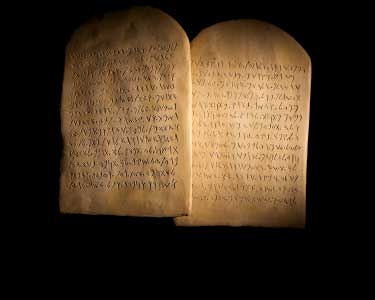Court Rules Ten Commandments Display Unconstitutional
 A federal appeals court in Denver ruled Monday that a Ten Commandments monument outside an Oklahoma county courthouse is unconstitutional.
A federal appeals court in Denver ruled Monday that a Ten Commandments monument outside an Oklahoma county courthouse is unconstitutional.
A three-judge panel of the 10th U.S. Circuit Court of Appeals said the privately funded monument, erected outside the Haskell County Courthouse in 2004, has the primary effect of endorsing religion when taken in context with the small community of Stigler, where it sits, according to the Associated Press (AP).
The panel noted that one commissioner said at the installation ceremony: “That’s what we’re trying to live by, that right there. … The good Lord died for me.”
“In a small community like Haskell County, where everyone knows everyone, and the commissioners were readily identifiable as such … the reasonable observer would have been left with the clear impression … that the commissioners were speaking on behalf of the government and the government was endorsing the religious message of the Monument,” the panel ruled.
Local pastor Mike Bush raised $2,000 for the 8-foot granite monument, saying “the Lord had burdened” his heart to initiate the project, according to the AP.
Haskell County resident James Green and the American Civil Liberties Union of Oklahoma later filed suit, claiming the monument violated the Establishment Clause of the First Amendment.
After a two-day bench trial in 2006, U.S. District Judge Ronald A. White ruled that the monument did not violate the Constitution. The monument sits in an area that includes memorials to veterans of World Wars I and II and subsequent wars, and a monument honoring the Choctaw Nation.
But the appeals court panel said a “reasonable observer” could view the monument as a county endorsement of religion. The court said also the Oklahoma case differed from other legal challenges to Ten Commandments displays because the Haskell County monument was relatively isolated on the courthouse lawn, and the lawsuit was filed less than a year after the display was placed. The judges also rejected the claim that the inclusion of the Mayflower Compact made the monument more secular.
County Commissioner Mitch Worsham told the AP that officials also may appeal the ruling. The Alliance Defense Fund (ADF) is also considering filing an appeal.
“Americans shouldn’t be forced to abandon their religious heritage simply to appease someone’s political agenda,” said ADF Senior Counsel Kevin Theriot. “There is no difference between this Ten Commandments display and the one at the Texas state Capitol that was upheld by the U.S. Supreme Court nearly five years ago. This one, like that one, was donated and paid for by a private individual and displayed among numerous other monuments to veterans, pioneers and others. The emotional response of a single, offended passerby does not amount to a violation of the Establishment Clause.”
In May, the Oklahoma Legislature approved placing a 3-by-6-foot Ten Commandments monument on the state Capitol grounds.












